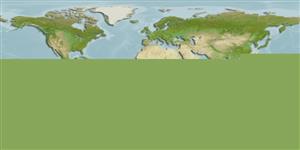>
Gobiiformes (Gobies) >
Gobiidae (Gobies) > Gobiinae
Etymology: Tryssogobius: Greek, tryo, tryso = to wear away + see under Gobius; sarah: Named for Sarah Crow; noun in apposition.
Eponymy: Sarah Crow accompanied Mark Erdmann on his surveys. [...] (Ref. 128868), visit book page.
Environment: milieu / climate zone / depth range / distribution range
Ecologia
marinhas associadas(os) a recifes; intervalo de profundidade 50 - 75 m (Ref. 90102). Subtropical
Distribuição
Países | Áreas da FAO | Ecossistemas | Ocorrências | Point map | Introduções | Faunafri
Western Pacific: Indonesia, Papua New Guinea, Palau and Ryukyu Islands.
Tamanho / Peso / Idade
Maturity: Lm ? range ? - ? cm
Max length : 2.2 cm SL (female)
Descrição suscinta
Chaves de identificação | Morfologia | Morfometria
Espinhos dorsais (total) : 6 - 7; Raios dorsais (total) : 10; Espinhos anais: 1; Raios anais : 11; Vértebras: 26. Characterized by pearly grey to whitish head and body; yellowish first dorsal fin except thin blue anterior margin and broad blue zone basally with yellow stripe; bluish second dorsal fin with pair of yellow strips; translucent caudal fin with blue-edged yellow band across upper and lower lobe; bluish anal fin with midlateral yellow stripe ending at acute posterior tip of fin; white pelvic fins with bluish posterior tip; dorsal rays VI+I,10; anal rays I,11; pectoral rays 17-18; cheeks with single row of scales; depth of body at level of pelvic fins 4.6-5.1 in SL; relatively narrow first dorsal fin, pointed at tip; pelvic fins reaching slightly beyond origin of anal fin, tip pointed; scales in longitudinal scale series 24-26; transverse scale rows 7-8; median predorsal scales 6, progressively larger anteriorly; body scales ctenoid to below posterior part of first dorsal fin, cycloid anteriorly; gill rakers 3-4+10-14; vertebrae 26 (Ref. 90102).
Occurs in areas exposed to relatively strong currents (Ref. 90102).
Ciclo de vida ou comportamento de acasalamento
Maturidade | Reprodução | Desova | Ovos | Fecundidade | Larvas
Allen, G.R. and M.V. Erdmann, 2012. Reef fishes of the East Indies. Perth, Australia: Universitiy of Hawai'i Press, Volumes I-III. Tropical Reef Research. (Ref. 90102)
Status na Lista Vermelha da UICN (Ref. 130435: Version 2024-1)
Ameaça para os humanos
Harmless
Uso pelos humanos
Ferramentas
Relatórios especiais
Baixar XML
Fontes da internet
Estimates based on models
Preferred temperature (Ref.
123201): 26.4 - 28.6, mean 27.3 °C (based on 44 cells).
Índice de diversidade filogenética (Ref.
82804): PD
50 = 0.5078 [Uniqueness, from 0.5 = low to 2.0 = high].
Bayesian length-weight: a=0.00724 (0.00339 - 0.01546), b=3.10 (2.92 - 3.28), in cm total length, based on LWR estimates for this (Sub)family-body shape (Ref.
93245).
Nível Trófico (Ref.
69278): 3.1 ±0.3 se; based on size and trophs of closest relatives
Resiliência (Ref.
120179): Elevada, tempo mínimo de duplicação da população menor que 15 meses (Preliminary K or Fecundity.).
Fishing Vulnerability (Ref.
59153): Low vulnerability (10 of 100).
